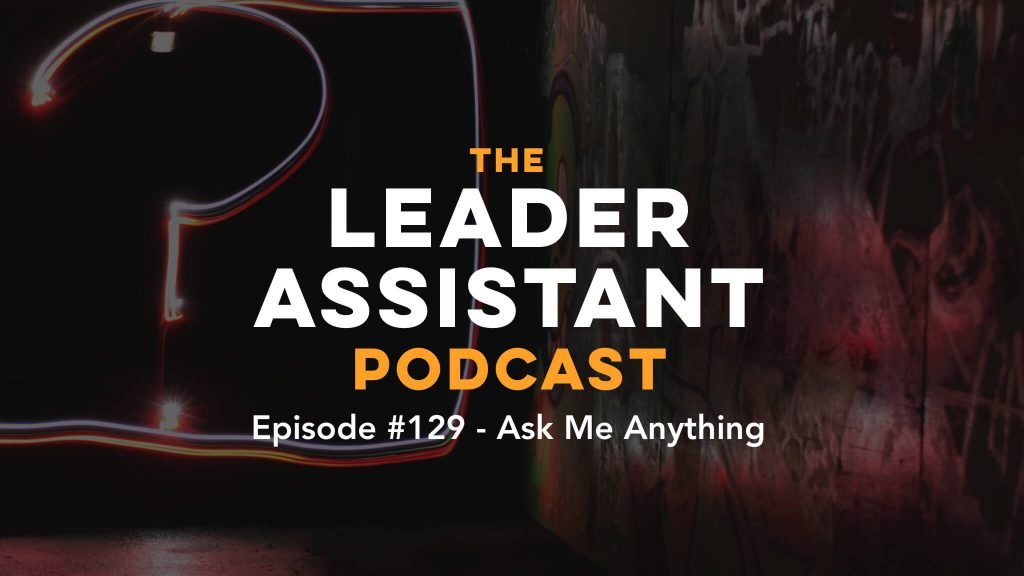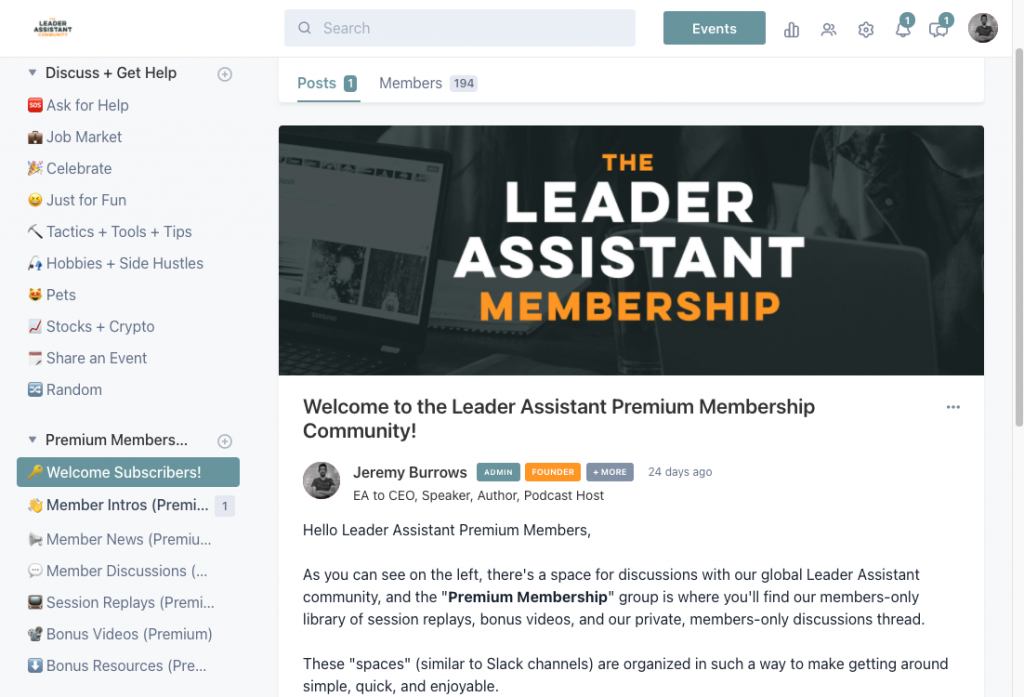The interviewer gets another chance to be interviewed by you.

In this Ask Me Anything episode of The Leader Assistant Podcast, I do my best to answer the following questions from assistants all over the world:
- How do you manage a team where one person has poor boundaries and the other is happy to take advantage?
- How do you encourage a fellow EA to be more humble?
- How do you encourage people to be accountable to deadlines?
- What is the ONE core competency that an EA must have to be excellent?
- What’s the greatest bias you have encountered as an EA?
CONNECT WITH ME
- My LinkedIn
- The Leader Assistant: Four Pillars of a Confident, Game-Changing Assistant
- Ask a question for a future episode by emailing me at podcast@leaderassistant.com
ABOUT ME
I’m a longtime executive assistant, international speaker and trainer, founder of The Leader Assistant Community and Premium Membership, author of the #1 Amazon Bestselling book, The Leader Assistant: Four Pillars of a Confident, Game-Changing Assistant, and host of the #1 podcast for assistants – The Leader Assistant Podcast.
I’ve worked with CEOs, professional athletes, Fortune 100 board members, billionaires, pastors—and their assistants—in both the nonprofit and for-profit sectors.
I’ve also had the opportunity to speak at administrative professional and executive assistant conferences all over the world, including Hong Kong, Thailand, and Germany.
I’m currently EA to the Founder and CEO of Capacity, a fast-growing artificial intelligence SaaS startup with an AI-powered, support automation platform.
My passion is to help you lead well, resist burnout, and automate before you’re automated.
I live in Kansas City, MO with my amazing wife and 2 boys. My hobbies are podcasting, beer, music, stocks, and entrepreneurship.
THE LEADER ASSISTANT PREMIUM MEMBERSHIP
To learn more about how you can join the now 200+ growth-minded Leader Assistants, check out our Leader Assistant Premium Membership for ongoing training, coaching, and community.
LEADER ASSISTANT LIVE EVENTS
Check out our constantly updated schedule of events for admins and assistants at LeaderAssistantLive.com.
THE LEADER ASSISTANT BOOK
Download the first 3 chapters of The Leader Assistant: Four Pillars of Game-Changing Assistant for FREE here or buy it on Amazon or Audible.
JOIN THE FREE COMMUNITY
Join the Leader Assistant Global Community here, or the Facebook Group here for bonus content and to network with other assistants who are committed to becoming leaders!
SUBSCRIBE
Subscribe to The Leader Assistant Podcast so you don’t miss new episodes!
You can find the show on Apple Podcasts, Spotify, Google Podcasts, Pandora, and Stitcher.
Join my email list here if you want to get an email when a new episode goes live.
LEAVE A REVIEW
If you’re enjoying the podcast, please take 2 minutes to rate and review the show on Apple Podcasts here. Each review helps me stay motivated to keep the show going!
—
EPISODE TRANSCRIPT
Podcast Intro 0:00
My dad is ticklish. The Leader Assistant Podcast exists to encourage and challenge assistants to become confident game changing leader assistants.
Jeremy Burrows 0:17
Hello, again, it’s Jeremy Burrows, host of The Leader Assistant Podcast, which is the show you’re listening to right now. How’d you like that for a different intro than usual trying to mix it up, recorded a bunch of episodes today in the Ask Me Anything series. And this is episode 129. And I’ve got four or five questions from assistants just like you who have sent in their questions. So I’m just going to jump right in and start with Susan B. Susan asks, How do you manage a team where one person has poor boundaries? And the other is happy to take advantage of the fact that that person has poor boundaries? That’s great question, Susan, I would say, have a conversation with both of them. The person that has poor boundaries, I would encourage them to really consider the health of the team and the organization and say things like and frame your statements and questions like when you let down your guard and let this other person take advantage of you. This is what it communicates to the team. Or when be or because you are struggling to say no, this other team member almost has permission to keep taking advantage of you. And show them the flip side, show them how you they can be more effective at accomplishing their goals and their executives goals. And just show them the win that they can get if they are better at having boundaries. And then when it as far as addressing the person that’s taking advantage of them, say, hey, when you put this extra work on so and so because you know that they’ll say yes, that communicates that you don’t care about their well being communicates that you don’t care about the team’s health. And we would really appreciate it if you could help this person set better boundaries. And we want to work as a team to be a sustainable long term, high achieving team and this would help in that scenario. So sometimes you need to get a mediator in there with you. I don’t know much about the context, Susan, to be able to address too much more on this. Hopefully that’s helpful. Hopefully, that’s my rant answer is helpful a little bit. So. But yeah, thanks for thanks for asking. Ginny W asks, How do you encourage a fellow EA to be more humble? Oh, that’s a good one. She says a colleague often often talks about herself and how she’s more accomplished than others in our field and tries to show that she’s above others, and cares about status, which is obviously not received well by others on the team. Well, Jenny, thank you for the question. I actually don’t know if you can help another person be humble, necessarily. But I do think that, like I was saying in addressing Susan’s question, framing the conversation, hey, when you talk about how you are more accomplished, that communicates to the rest of the team, that you don’t value our contributions. So again, just acknowledging that there is kind of a perceived reality that she’s communicating that the rest of the team is hearing and is thinking, Okay, this is okay, we get it, you’re accomplished. Sure you have this award. Are you sure you have this or whatever, but that doesn’t actually help. And so they’d be saying things like what when you talk about your accomplishments, that doesn’t help the team move forward. So anyway, hopefully, you’d have a good conversation with them. And that they will be grateful for the opportunity and humbled themselves a little bit. All right, the next question is from cyno. M, might be C No, not sure think it’s snow? And how do you encourage people to be accountable to deadlines? So again, I think it’s all about focusing people on the ultimate goals of the team and organization, in your department or your division. And just listen when you miss this deadline, that pushes the project back six weeks, or when you continue to miss deadlines, that causes other people on the team to miss deadlines, which causes the entire organization to get off track. So again, it’s not about a emotional, dramatic conversation. Why can’t you keep deadlines and, you know, if you don’t keep this deadline, and we’re gonna fire you, and all that kind of stuff. It’s about communicating the overall goals of the organization and making it about the objective value and goals of the team and saying, listen, when you don’t meet your deadlines, it there’s a ripple effect. And we want you to be aware of that. And we’re asking you to help us help you by meeting your deadlines. But I will also say sometimes the deadlines are unreasonable. So if it’s if it’s continuing to happen, is there something about the deadlines that are they just unrealistic? Are they are you not is your team not seeing something on their side that would cause a deadline to be just insane to try to meet? So that can be the issue too. So definitely look at and reassess. Why do you have these deadlines? Why are they being missed? How can we be more honest about how long it takes us to do things? So anyway, great question. Hope that’s helpful. Another one is Vivian J, she says, What’s the one core competency that an EA must have to be excellent. So I’m going to cheat on this one. And I’m going to talk about five because that’s how many I have in my book five game changing characteristics of the leader assistant. The five are discerning. In other words, you make decisions you make the right decisions at the right time. For the right people, and or for the to solve the right problems. Study. And I talked about a little bit in Episode 128, just being steady in the chaos. And that’s, that’s a very, very big core competency. And then confident you got to be confident, humble, speaking of humility, and then future proof. So future proof is kind of a two headed dragon. One side is being emotionally intelligent, and other side is embracing automation in AI in your role to automate repetitive manual tasks in your job. So those are five discerning, steady, competent, humble and future proof and I dive into those in my book, you can get that at Amazon dot leader asst.com. But if I had to pick one, then I would probably say discerning because discerning is also about decision fatigue, helping your executive avoid decision fatigue. And really having that instinct to know what to do when your executive either is questioning what they should do, or isn’t around. Or your team is looking for somebody to lead and somebody to just make a decision and go for it. Sometimes you make the wrong decision. That’s okay. The discerning though, you know, that it’s important to make a decision sometimes even if it’s the wrong one. So that’d be my one core competency. If I had narrowed down to one, I’d say discerning. All right, and then Jennifer C asks, What’s the greatest bias you have encountered as an EA? And this is a really interesting question. I’m gonna answer it based on
the fact that I’m a male executive assistant. For those of you who don’t know, I’m currently an executive assistant at a software company support automation platform company called capacity in St. Louis, Missouri. I work remotely from Kansas City, Missouri. If any of your teams were this little side note plug for capacity if you work in the customer success or support or employee engagement and support teams for your organization, and, or you work for the helpdesk or Support Desk team, our support automation platform, automates processes, our help desk, eliminates an auto resolves tickets and eliminates many of the emails and phone calls that your team gets for those repetitive questions and issues. So definitely check us out@capacity.com If you’re interested in automating and improving your support automation for either internal employees or external customers, that, you know, basically our mission is to help you do your best work. And so we can automate a lot of your support processes and help you do that. Anyways, back to the question, what’s the greatest bias even carers anyway, so I’m a male executive assistant. And I don’t know if I’m going to be able to explain this. In a way that makes sense. But I’m going to try because this has asked me anything, and I’m going to do my best. But I’ve experienced situations where I have, because I’m a male executive assistant. I’m almost like expected to be using this role as a stepping stone. And so I’m almost like expected to move into director of operations or move into whatever I’ve been asked before, like, hey, you know, what, what’s your next step? Do you see yourself being Director of Operations? And I think that one, there’s a whole conversation on, you know, EAS, is EA a stepping stone role? I should don’t think it is I actually love the role. I think it’s a career. I don’t have any intention of leaving this role. But I think that the bias was that because I, I am a male, they almost saw that potential in me where they, the bias would be that they like in favor of, of me as a male, versus, you know, all of the female executive assistants out there, maybe not getting that opportunity or not, maybe having to initiate it on their end versus having someone come to them and say, Hey, do you want to be the Director of Operations? I think you’d be great for that. So in my personal experience, I think that that would probably be the greatest thing that I’ve encountered is like, hey, you know, you know, the logical next step is for you to take on more leadership. Because you’re a dude. And I haven’t experienced a ton of it. But I was just trying to think of one example. And I think that’s probably one that I haven’t thought about is that it’s the it was necessarily a bias encounter. So anyway, I think that’s unfair that people would see that. But I also, again, think that EA is not a stepping stone role. It’s a career and if you want it to be a stepping stone, sure, if you want to move on to director of operations or chief of staff or whatever, then that’s great. So anyway, Jennifer, great question. Hopefully, that’s, that’s helpful to you. But thanks for sending in all those questions. Please keep them coming. You can send them to podcast at leader assistant.com and I’ll answer them in a future episode. This has been episode 129. You can check out the show notes at leaderassistant.com/129 and I hope you’ve enjoyed it. And I look forward to talking with you soon. Thank you for being a leader.
Unknown Speaker 14:17
Please loom you on Apple podcasts. Goburrows.com






